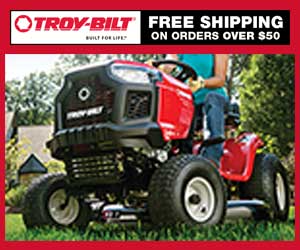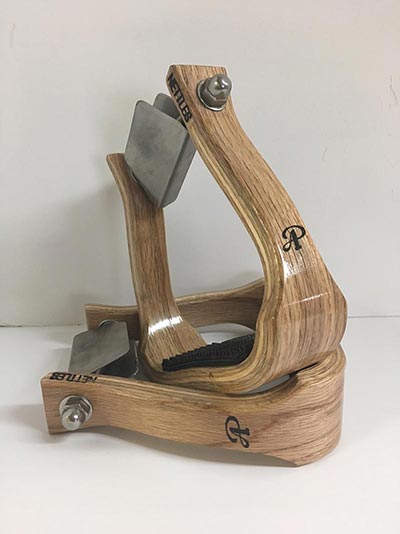
by Nick Pernokas
Ronnie Nettles’ legs were bothering him. His narrow oxbow stirrups, the norm for cutting horse trainers in the 1980’s, were rubbing on his shins. It probably wouldn’t have bothered a guy who just had one horse to ride, but as a cutting horse trainer at the top of the game, Ronnie had a barn full of horses to work every day. He got relief by wrapping his legs with Vetwrap every morning.
Still, Ronnie was one of the lucky few that have been able to hang out their shingle, and make a living doing what they love to do. Ronnie didn’t just make a living though; he was successful enough to be a major player in the National Cutting Horse Association events.
“Horses have always been a passion with him, not a job,” says Gala Nettles, Ronnie’s wife.
The Madisonville, Texas, trainer won the NCHA Cutting Futurity in 1984, which is the dream of every cowboy that swings a leg over a cutting horse. He followed this by being co-champion of the NCHA Superstakes in 1985, co-champion of the NCHA Derby in 1989 and numerous other awards along the way. Ronnie realized that even with the financial boost winning those titles brought, long-term security could be fickle when depending upon the luck of the draw. The oil boom, which had supported much of the horse industry in the Southwest, was coming to an end. Customers who had paid the training bills were starting to have hard times. He wanted something else to ensure stability for his family.
Ronnie had inherited a love of woodworking from his father, who had been a carpenter. He had a small shop where he built items for the ranch as a hobby. One Christmas, Gala had searched for an heirloom quality rocking horse for her first grandchild with no luck; none of them met her standards for size, appearance or sturdiness. Finally, Gala found a picture of one in a magazine that was really nice.
“Do you think you could build one of these in nine days?” Gala asked Ronnie. They had just returned home from a grueling two-week futurity in Fort Worth; Ronnie welcomed a different challenge. Working late every night, he cut, glued and sanded until he created a beautiful rocking horse. He topped it off with a replica of a saddle that he carved from oak. Only one thing remained – he needed to find some miniature stirrups.
“I wanted everything realistic, and to scale, and there weren’t any small stirrups to buy,” chuckles Ronnie, “so I cut strips of white pine, soaked them in water, then built a little jig to hold the pieces and glued it together.” The first Nettles Stirrups were born.
When Ronnie realized that he could build a stirrup, he became enthused about building an oxbow for himself, one that he could ride all day without becoming sore. He also wanted a little more width in the center for safety and lamination for strength. The week after Christmas Ronnie built his first pair, out of an oak wheelbarrow handle, in Gala’s kitchen. They worked so well that he used them when he showed his cutters. At the NCHA Finals in Houston that year, Doug Loesch from Leddy's looked at a pair and encouraged Ronnie to make some up to sell. By March he had seven pair for Leddy’s to display at a cutting. After the show, as he took a couple pairs back to his truck, he stopped to visit with legendary cutter Buster Welch. Buster liked the stirrups and bought the first pair; Ronnie was in business. By solving his first problem of sore feet, he’d also solved his long term “problem” of a secondary income.
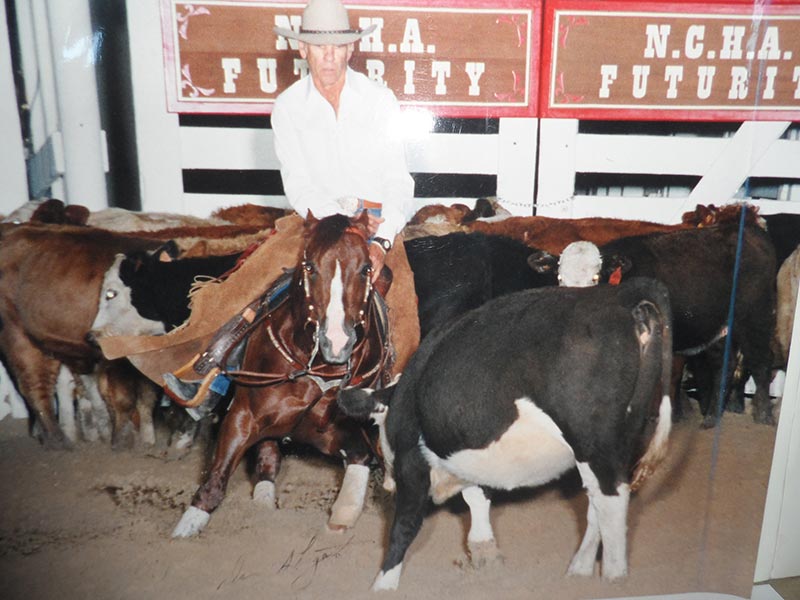
Ronnie kept riding horses during the day, but began working on stirrups at night. He designed metal jigs to build the oxbow stirrups in, and then added a two-inch flat-bottom stirrup. Eventually, Nettles would build close to 300 styles and sizes. By the time his son, Robby, graduated from college, he was needed in the family business. Now Robby manages the company and builds the Premier stirrups, Ryan Langolf builds the other stirrup lines and Ronnie works on designs, as well as building new machinery when needed. Ronnie invented much of the machinery to produce the stirrups himself and is constantly trying to come up with new ideas to improve production. These innovations include a stirrup slicing saw, aluminum jigs, a shaping machine and a drilling machine for stirrup bolt holes. All of these tools make the job easier. While not an assembly line, this does allow a few people to turn out a lot of stirrups.
Precision is the catchword for every step of production. For years the Nettles actually did the logging themselves, to ensure the use of live, high-quality wood. The Madisonville area has an abundant supply of Texas Pin Oak. Recently, they found a logging company that would let them pick and choose the logs that they wanted for production. The logs are cut into eight-foot planks at a saw mill. The boards are sliced into layers suitable for lamination and then cut to length. The pieces are graded and inferior ones discarded. The pieces are then soaked in the “cooker” until they’re soft and ready to be bent around a jig. When dry, the pieces are glued together in another jig. The long stirrup-shaped piece is cut into several individual stirrups by hand to ensure smoothness and accuracy. After an extensive sanding process, the holes are drilled, the stirrups are varnished and finally the treads and tops are added. Inlays are added with a seventh piece of wood, so they don’t have to cut into the first six layers.
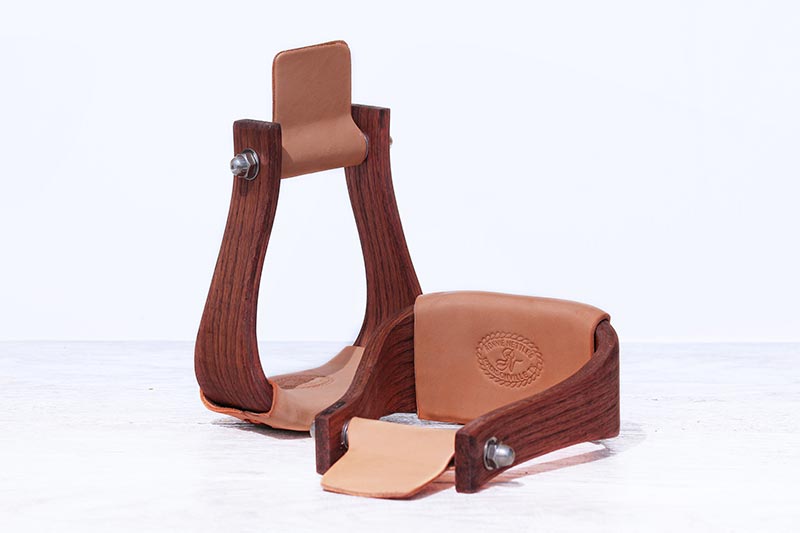
Most importantly, the name is stamped on every stirrup to make sure the customer knows that they’re getting a genuine Nettles stirrup. Eventually copies began to show up. Ronnie went to the Denver Market and a salesman tried to sell him a pair of knockoffs for $9. Gala admits that they can’t put the leather on for $9. Fortunately, the mass production needed for overseas commerce negates the individual, knowledgeable approach taken by Nettles. They may get the look, but Gala feels that they miss the principles of function and the quality, achieved by the 39 slow steps used to produce one of their stirrups.
“The best thing about our stirrups is that Ronnie Nettles still sits in the saddle every day,” says Gala. “So many people that build stirrups today have never sat in a saddle.”
One of Nettles’ best selling stirrups was designed by Ronnie to improve on the old oxbows he’d always used. It was called the Half Breed; it was a one-inch oxbow-style side combined with a two-inch flat bottom. This stirrup has a good feeling of freedom, but offers more support, and safety, than the old oxbows designed to be used with an under slung cowboy heel.
Gala feels that Ronnie is aware of the little things that contribute to the comfort of a stirrup – he personally tests all of the designs himself. Gala also thinks that saddle makers often get blamed for comfort problems that are actually stirrup problems.
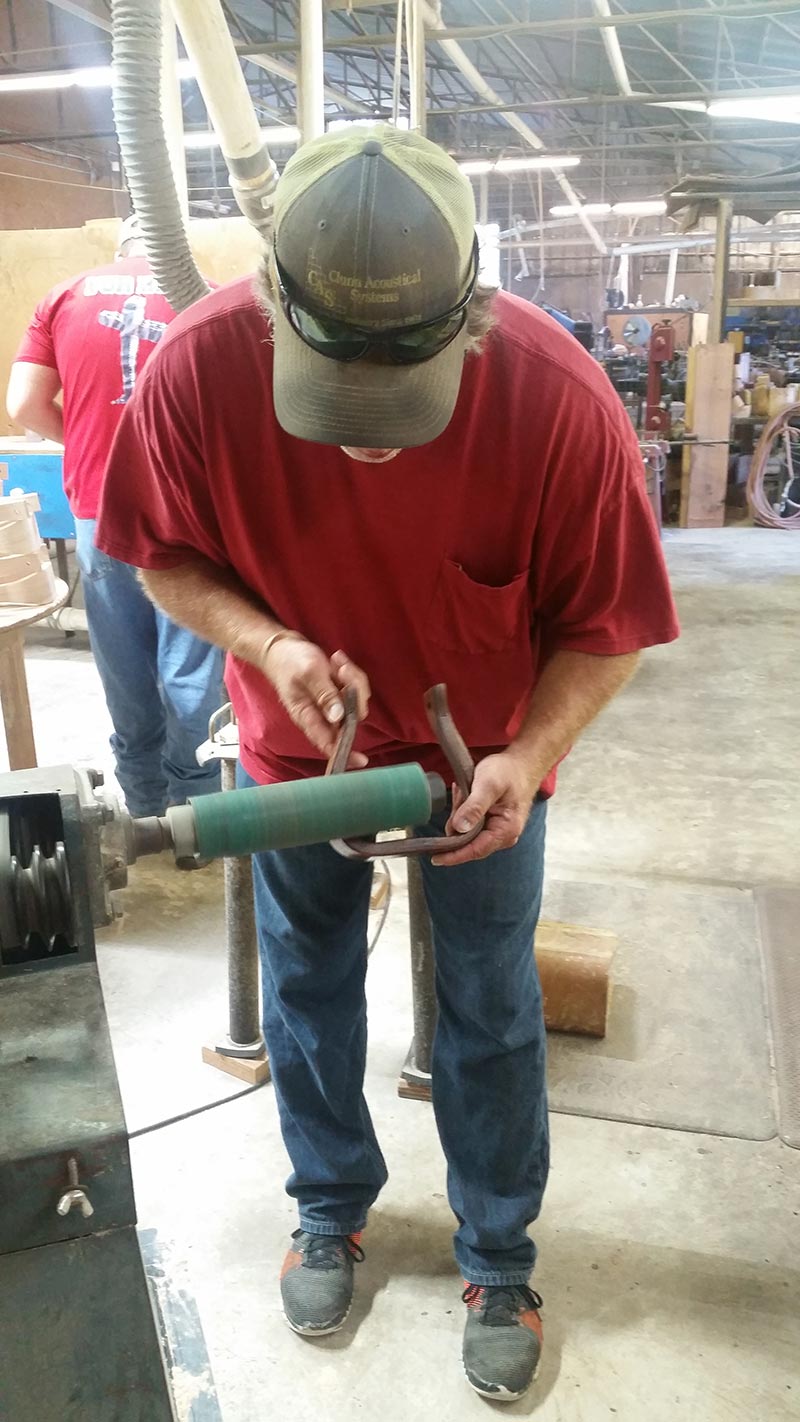
“Start at the bottom and go up,” says Gala, when a customer has a comfort problem in his feet or knees. “If your foot is not level, then it will throw your knee out. This can even affect your hip”.
To help with this problem, Ronnie invented an option called “The Leveler” a couple of years ago. The Leveler can be installed at the top of any Nettles stirrup; it helps your foot maintain a more natural, orthopedically correct position. The Nettles have trouble keeping up with the demand for this unique device.
The Nettles have three lines of stirrups. The Premier line is the top of the line with six laminated layers of oak, Hermann Oak leather tops and treads. Exotic woods can also be used in its construction. This stirrup can be personalized with inlays of a different colored wood in a brand, initials or anything else. The next line is called The Duke, which is basically a five-layer, off-the-rack stirrup. The Blank stirrup is a four-ply stirrup, which is used by saddle makers for covering. All are handmade. “Our goal is to be 100 percent wholesale,” says Gala. “Right now we’re at about 80 percent. The other 20 percent is mainly for the people who want an elaborate, customized stirrup.”
The innovations have continued. A few years ago Ronnie collaborated with barrel racer Sharon Camarillo on “The Gripper,” which is a rubber pad on the topside of the stirrup tread area. The Gripper makes it harder to “blow” a stirrup. As Nettles stirrups have increased in popularity with barrel racers, they’ve added a distressed paint job to them, available in any color. These stirrups can be color coordinated with the rest of an outfit.
In addition to the stirrups, Ronnie also builds a handy lace beveller for leather crafters. Nettles Country is actually the name of the storefront, which offers a wide variety of Texas-flavored furnishings, art and gifts, in addition to stirrups.
Gala, also a horsewoman, has written over 14 books and for many magazines. Her last book, Smart Little Lena, was well received in the equine world. She and Ronnie have raised nine children between them; three came from broken homes and the Nettles took them in. Ronnie successfully battled colon cancer in 2005 with surgery and chemotherapy. A knee replacement followed. He still trains horses, but during the heat of the day he comes into the shop to help out on the stirrups. When the hot, afternoon sun starts to go down, Ronnie will be back in the round pen on a colt, easing around a bunch of cattle. For Nettles Stirrups, the research and development never ends.
To find out more about all of the products at Nettles Country, call 800-729-2234, or go to www.nettles-stirrups.com.
Nettles Country
1087 Nettles Lane
Madisonville, TX 77864
This article is originally published on www.shoptalk-magazine.com and re-published here with permission.






